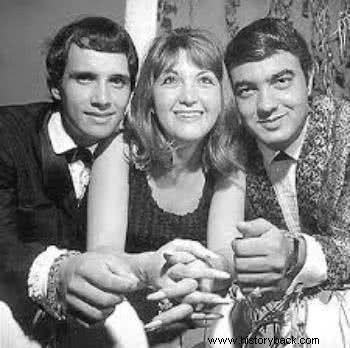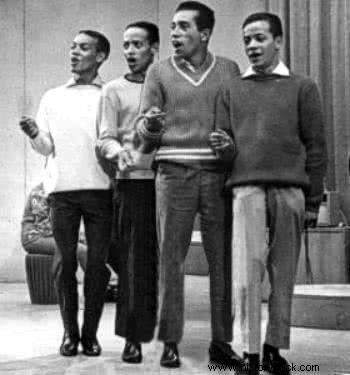The Young Guard refers to the musical program shown on TV Record in São Paulo from 1965 to 1968, presented by Roberto Carlos, Erasmo Carlos and Wanderléia.
The program's name helped to baptize the musical and aesthetic movement that introduced rock to Brazil. Currently, several of its members are still connected to the musical activity.

Roberto Carlos, Wanderléia and Erasmo Carlos in the program.
Young Guard Program
The program "Jovem Guarda" premiered on 22.08.1965, on TV Record, led by three singers on the rise at that time. Roberto Carlos had already exploded in 1963 with a version of "Splish Splash", by Bobby Darin and DJ Murray the K, in the Brazilian version of Erasmo Carlos. For his part, Wanderléia had won several radio singing contests and had released his first single in 1962.
The recordings took place at Teatro Record, on Rua da Consolação, in São Paulo and was broadcast live. In Rio, there was a version shown during the week directed by Carlos Manga broadcast by TV Rio. The rest of the country had to wait to watch it on videotape, as there was no satellite rebroadcast.
Over the course of an hour, the trio sang their hits and entertained guests. Quickly, the show became a ratings leader and caused hysteria in the fans who packed the theater's premises.
The rebellious posture, the frenetic rhythm and the innocent lyrics, but identifiable by the teenage audience, ensured the success of the program.
Historical Context of the Young Guard
In the 1960s, Brazilian music established Bossa Nova. Elaborate lyrics, sophisticated harmony and a new beat that mixed jazz and samba. It was the youth from the South Zone of Rio de Janeiro who renewed the Brazilian music scene.
However, in the suburbs of the same city, there were young people who were more attuned to Elvis Presley rock. of the Beatles and the Rolling Stones.
The Jovem Guarda was seen by a part of the intelligentsia as frivolous because of the theme of their songs and their poor melodies.
From 1964, when the dictatorship was installed in Brazil, the members of the Jovem Guarda began to be identified as "alienated" by those who fought the military government.
In this context, the rock and ballads proposed by Jovem Guarda were the perfect answer to escape the complicated 60's.
Instead of worrying about the Cold War and the Vietnam War, viewers preferred to dance to "Somebody in the Crowd" performed by the Golden Boys.

Golden Boys performing in the Jovem Guarda show.
Songs from the Young Guard
The first songs by Jovem Guarda were versions of hits from the American and British songbooks. We can mention the version of “Girl”, by the “Beatles”, which became the song “Meu Bem”, a hit in the voice of Ronnie Von. Also Neil Sedaka's "Stupid Cupid" was a big hit with Celly Campelo singing "Stupid Cupid."
At the same time, Roberto Carlos and Erasmo Carlos began to make compositions along the lines of Anglo-Saxon rock. The lyrics talked about dating, conquests, cars and freedom. Examples of this theme are “I want everything to go to hell”, by Roberto Carlos (1965) and “Festa de arromba”, by Erasmo Carlos and Roberto Carlos (1965).
However, there was room for ballads like “Devolva-me”, by Lilian Knapp and Renato Barros, a hit with Leno and Lilian. Likewise, “Eu te amo anyway”, composed and performed by Martinha, in 1966.
Aesthetics of the Young Guard
Jovem Guarda left marks on the behavior of teenagers, launching fashion and slang. Fancy clothes like down coats, bold colors and the ubiquitous miniskirt for girls. The hair should be long like the Beatles and the posture should be as relaxed as possible.
The language was invaded by expressions such as "it's a hot one, do you live?", "a clean bar" and "it's a firm conversation". These expressions were taken from the lyrics of the songs featured on the program.
Legacy of the Young Guard
With the end of the program on TV Record, in 1968, the members of Jovem Guarda took different paths.
It can be said that the movement generated three direct heirs:Tropicalismo, the sertanejo and the national rock.
Tropicalismo mixed electric instruments with Brazilian acoustic ones. Caetano Veloso and Gilberto Gil had no prejudice in approaching Roberto Carlos and his gang. This friendship earned him the beautiful song “Under the curls of your hair” made by Roberto Carlos when Caetano was exiled in London.
The country music followed the trail of romanticism distilled in the lyrics of Jovem Guarda. Sérgio Reis became a successful country singer. Singer-songwriter Martinha is in high demand to write for duos such as Chitãozinho and Xororó.
In later years, several national music stars continued to record Jovem Guarda songs. The band Skank recorded in 1994 “É forbidden smoke”, by Roberto Carlos (1964). Marisa Monte recorded in 2016 “What is it worth?” by Roberto Carlos (1967).
Young Guard Interpreters
Roberto Carlos, Erasmo Carlos, Wanderléia, Golden Boys, Ronnie Von, Os Vips, Martinha, Celly Campello, Leno and Lilian, Renato and his Blues Caps, The Fevers, Jerry Adriani, Rosemary, among other names.
Curiosities
- The name of the program came from a phrase by the leader of the USSR, Lenin:"the future belonged to the young guard because the old guard is outdated".
- The movement was also called "iê-iê-iê", a Brazilianized form of the expression "yeah-yeah-yeah" sung by the Beatles in "She loves you".
- The Jovem Guarda was viewed with sympathy by the military government, but Roberto and Erasmo Carlos had to resort to metaphors in order not to see their work censored.
